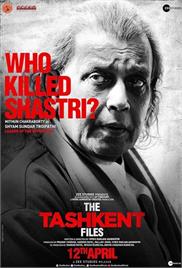
Likes: 23
Views: 14.19K
The Tashkent Files is an upcoming Bollywood thriller about the death of Indian prime minister Lal Bahadur Shastri. The film has been written and directed by Vivek Agnihotri and it stars Naseeruddin Shah and Mithun Chakraborty.
Duration: 134 min
Released: 2019
IMDb Rating: 8.4/10 (628 Votes)
Stars: Mithun Chakraborty, Naseeruddin Shah, Mandira Bedi, Pankaj Tripathi
Directors: Vivek Agnihotri
Writers: Vivek Agnihotri
Year: 2019
The Tashkent Files is a compelling Indian mystery drama film released in 2019 that delves into the controversial and enigmatic death of the former Indian Prime Minister Lal Bahadur Shastri. Directed and written by Vivek Agnihotri, the film presents a suspenseful and investigative narrative, unraveling layers of political intrigue, conspiracy, and historical speculations.
The movie stars an ensemble cast of some of Indian cinema's most talented and respected actors. Among the prominent faces are Shweta Basu Prasad, who plays the lead role of a young, curious journalist determined to unveil the truth behind Shastri's death. Veteran actor Mithun Chakraborty brings gravitas to the story, contributing significantly to its intense atmosphere. The film also features powerful performances by Naseeruddin Shah, Vinay Pathak, Pallavi Joshi, Rajesh Sharma, Mandira Bedi, Mohan Kapur, Achint Kaur, Prakash Belawadi, Pankaj Tripathi, and Ankur Rathee. This talented ensemble enriches the film with diverse characters who add crucial perspectives to the mystery.
Plot Overview:
The narrative is set against the backdrop of one of India’s most debated and lesser-understood historical events — the death of Lal Bahadur Shastri in Tashkent, Uzbekistan, shortly after signing the Tashkent Agreement in 1966. Officially, the cause of death was reported as a heart attack. However, the film challenges this established narrative, weaving a larger mystery that explores political conspiracies and possible cover-ups.
The story unfolds through the eyes of Ragini Shukla (played by Shweta Basu Prasad), a young and persistent journalist who receives a letter urging her to revisit the circumstances surrounding Shastri's death. As she delves deeper, Ragini uncovers classified information and interviews a range of people—including government officials, eyewitnesses, and experts—who present conflicting accounts. Each piece of evidence raises new questions, casting doubt on the official explanation and suggesting a planned assassination to protect powerful interests.
Throughout the film, the audience is taken on a riveting journey filled with suspense as the truth hangs precariously between fact and fiction. The multilayered dialogues and intellectually charged debates engage viewers to ponder over historical interpretations and politics.
Characters and Performances:
Direction and Writing:
Vivek Agnihotri, serving as both writer and director, approaches this sensitive and complex topic with a mix of investigative storytelling and emotional engagement. His screenplay meticulously constructs an intricate web of facts, rumors, and political intrigue. The dialogues are sharp and purposeful, aiming to provoke thought and debate on a chapter of history that remains shrouded in secrecy.
Agnihotri’s directorial style is straightforward, focusing heavily on narrative and character interaction rather than cinematic gimmicks. The film mostly unfolds within closed settings, adding to the claustrophobic feeling of a conspiracy being unraveled in real time. The pacing is deliberately measured, allowing the audience to absorb the nuances and weigh the conflicting accounts.
Cinematography and Production:
The film’s cinematography complements its mood effectively, using somber lighting and muted colors to reflect the gravity of the subject. The setting and period detail help recreate the 1960s ambience with authenticity, enhancing the immersive experience. The production design pays attention to subtle details that evoke the era’s political climate.
Music and Soundtrack:
Unlike typical Bollywood movies that often emphasize songs and musical numbers, The Tashkent Files is focused more on narrative and suspense and does not feature a traditional song-and-dance soundtrack. The film relies on its background score to build tension and underscore the emotional beats of the story, rather than original songs. This approach suits the film’s intense and serious tone, maintaining a consistent atmosphere throughout.
Reception and Impact:
Upon its release, The Tashkent Files sparked considerable discussion across India, primarily because it touched upon a lingering historical mystery that had long fascinated and divided public opinion. While some viewers appreciated the film for courageously questioning the official historical narrative and encouraging dialogue, others critiqued it for perceived bias and dramatization.
Regardless of the varied critical opinions, the film succeeded in reviving interest in Lal Bahadur Shastri’s life and death, encouraging a younger generation to re-examine this chapter of Indian history. It also led to renewed debates on the nature of political transparency and accountability in post-independence India.
Conclusion:
The Tashkent Files (2019) stands out as a bold, politically charged drama that intertwines mystery and historical investigation through a gripping screenplay and thoughtful performances. With an accomplished ensemble cast led by Shweta Basu Prasad and Mithun Chakraborty, the film delivers an intense exploration of political conspiracies surrounding a pivotal event in Indian history. Directed and written by Vivek Agnihotri, it challenges viewers to question established truths, making it a significant cinematic contribution to Indian political and historical discourse.
For audiences who appreciate cerebral dramas and historical mysteries, The Tashkent Files offers a gripping cinematic experience that combines suspense with a provocative look back at a controversial moment in India’s past.
Subscribe to our mailing list to receive updates for latest hindi movies. Stay Connected!